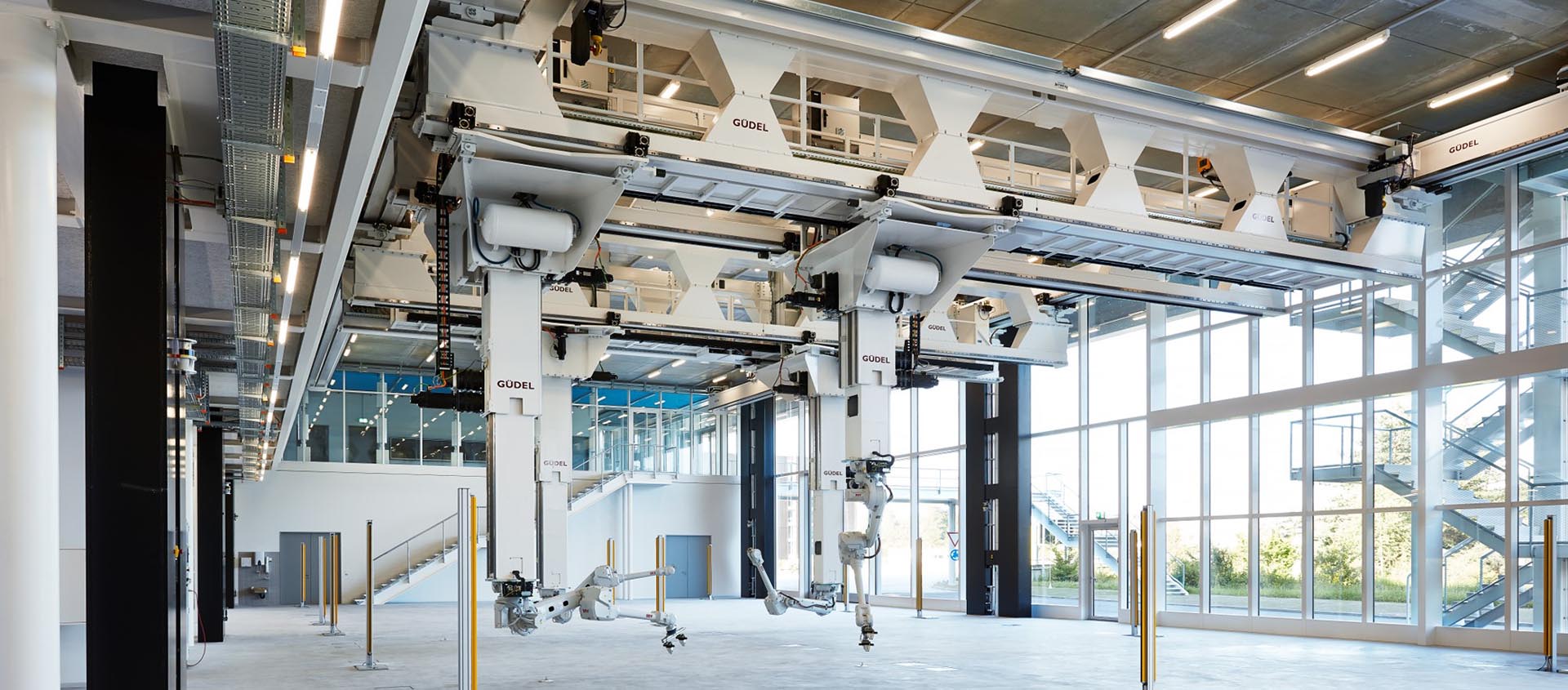
Speakers

Arash Adel
Arash Adel is an architect, educator, and currently a Ph.D. Research Fellow at the Chair of Architecture and Digital Fabrication at the Swiss Federal Institute of Technology (ETH) in Zurich. In October 2015, he was awarded one of ETH’s prestigious and highly competitive “Architecture & Technology” doctoral fellowships. Prior to joining ETH, he was a lecturer in Architecture at University of California (UC), Berkeley and the recipient of the Weller Research Fellowship in Architecture at Washington State University (WSU). He has taught design studios, seminars, and computational design workshops in the United States and abroad. His professional experience includes projects in Europe, China, the Middle East, and North America. His work has been recognized with several awards and has been published in numerous publications. He has lectured at institutions, including UC Berkeley, Rice University, University of Milwaukee, University of Idaho, Washington State University, and the Moscow City Hall. His work has also been widely exhibited at various galleries, institutions and events, including AIA National Design Week in Spokane, Museum of Arts at WSU, Harvard Graduate School of Design, Third Gallery Idaho, and the Middle East Technical University in Ankara. He holds a Master of Architecture from Harvard University.

Petrus Aejmelaeus-Lindström
Petrus Aejmelaeus-Lindström studied architecture at the Royal Institute of Technology, School of Architecture. During his BSc studies he worked parallel with several research projects concerning material research and through this he came in contact with Rolling Optics, a company developing a new kind of holograms. He worked there as a designer at the research department. During a study trip to Switzerland he visited DFAB and since then he has been interested in robotics and digital fabrication and therefore he applied for an ERASMUS at ETHZ. During his exchange year at ETH he did the elective course at DFAB twice and focused on computational courses at the CAAD chair and the Information Architecture chair. His interests are focused on hyper complex and mega ornamental architecture. He worked as an intern at the chair from June 2012 to August 2014. After his intern position he went back to Sweden to hand in his Diploma. Since 01.02.2015 he is a PhD Researcher at the Chair for Architecture and Digital Fabrication.
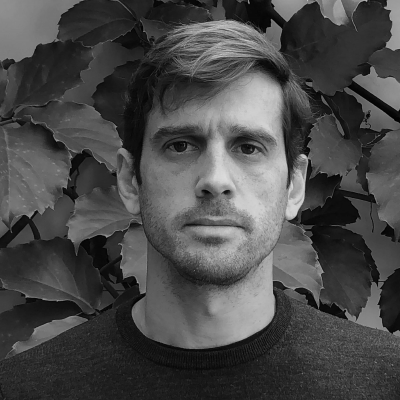
Miguel Aflalo
Miguel Aflalo holds an ITECH MSc. from the University of Stuttgart in Germany and Bachelor’s degree in Architecture from Mackenzie University in São Paulo. He has 12 years of experience working in Brazil and the United States in different companies in the areas of Architecture and Industrial Design. More recently he has worked as BIM Manager and Project Coordinator implementing BIM platforms and developing parametric solutions for architecture companies in Brazil. Recently, migrating to areas of Computational Design, Digital Fabrication, Robotic Manufacturing, the focus of his work is to join innovation and technology to create multidisciplinary solutions in projects that benefit from the use of technological tools from conception to manufacturing.

Martín Emilio Alvarez
Martín Emilio Alvarez Arch, MSc.(Dist) (b. Buenos Aires, 1982) is a Research Associate at the Institute for Computational Design and Construction. He studied Architecture at the University of Buenos Aires (U.B.A.) where he received his architectural degree in 2008 and continued teaching as a tutor in the chairs of Prof. Lombardi and Prof. Solsona. After graduating, he employed computational methods in many international projects at Ciro Najle General Design Bureau and completed various constructions at Estudio Ruiz Orrico in Argentina.
Before joining Institute for Computational Design and Construction in 2017, he collaborated with arch22 (Stuttgart) and completed the ITECH program (Dist). His current research focuses on the design of lightweight timber structures.
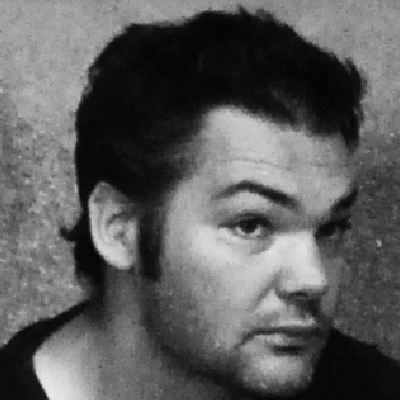
Phil Ayres
Phil Ayres is an architect, researcher and educator. He is an Associate Professor at CITA, which he joined in 2009 after a decade of teaching and research at the Bartlett, UCL. His primary research focus explores the development of adaptive architectural systems that couple technical & organic elements, together with the development of complimentary design environments. This is currently pursued through the EU funded project flora robotica of which Phil is a Principle Investigator. Phil’s teaching roles are focused at Masters and PhD level and he is also the editor of the title Persistent Modelling – extending the role of architectural representation published by Routledge.

Joshua Bard
Joshua Bard is an Associate Professor at Carnegie Mellon University. Joshua conducts applied research at the intersection of construction culture and robotic technology. Joshua creates augmented construction and design systems combining the best of human skill, algorithmic translation, and robotic automation. Joshua teaches graduate and undergraduate studios and seminars in the School of Architecture.

Christopher Battaglia
Christopher A. Battaglia is the 2018-19 Design Innovation Fellow and Assistant Teaching Professor at Ball State University and the 2018-19 Exhibit Columbus: University Design Research Fellow. Battaglia is focused on researching techniques to spatialize concrete through additive manufacturing and digital fabrication techniques. With an interest in material manipulation, computation, and the fabrication of self-built digital tools, Battaglia looks to adapt multiple different processes in the assembly of bespoke architectural components. Battaglia is a graduate of Cornel University (M.Arch 2017) where he received the AIA Henry Adams Medal and Certificate of Merit 2017 and Eschweiler Prize for Merit and Distinction in M.Arch Design Studio 2017. He is also a graduate of Wentworth Institute of Technology (B.S. 2013) graduating Cum Laude. Battaglia continues to work in collaboration with the Robotic Construction Laboratory (RCL) at Cornell University.

Giovanni Betti
Giovanni Betti is an Architect based in Berlin where he leads the “Performance Based Design” team at HENN. The team acts as an internal consultancy and research unit pursuing investigations in the future of architectural technologies for construction and design. At HENN Giovanni also coordinates collaborations with Academic Institutions; those include, among others, the InnoChain ETN network, a shared research training environment examining how advances in digital design tools challenge building culture enabling sustainable, informed and materially smart design solutions. Prior to joining HENN, Giovanni was Associate Partner in the Specialist Modelling Group at Foster+Partners, specialising in complex geometrical problems, environmental analysis, simulation and digital fabrication.

Shajay Bhooshan
Shajay Bhooshan pursues his research in structure and fabrication aware architectural geometry as a PhD Candidate at the Block Research Group, ETH Zurich. Previously, he has worked at Populous, London and completed his M.Phil from the university of Bath and M. Arch from the AA School of Architecture, London. He is also the co-founder and head of the computation and design group (ZHCODE) at Zaha Hadid Architects, London.

Giulio Brugnaro
Giulio Brugnaro is a trained architect, designer and researcher working in the field of robotic fabrication for architectural production. He is currently PhD Candidate and Marie Curie Fellow at The Bartlett School of Architecture in London as part of the InnoChain Research Network. His research focuses on developing adaptive robotic fabrication processes and sensing methods that allow designers to engage with material behaviours and tool affordances to explore novel design opportunities.
Previously he received a B.Arch. in Architectural Sciences at IUAV University of Venice and a M.Sc. in Integrative Technologies and Architectural Design Research at the University of Stuttgart.

Ryan Chee
Ryan Chee has recently graduated from the Singapore University of Technology and Design with a Masters in Architecture. His research interest lies in digital fabrication of concrete through experimental design methods.

Zach Cohen
Zach Cohen is a recent a graduate of the Master of Science in Architecture Studies program at the Massachusetts Institute of Technology(MIT). He is currently a Technical Instructor in the School of Electrical Engineering and Computer Science at MIT and an Adjunct Lecturer in the Department of Architecture at the Wentworth Institute of Technology. He is also a Principal of a small architectural design practice called Shiber Cohen Studio, which is currently working on projects in New York City and Detroit.
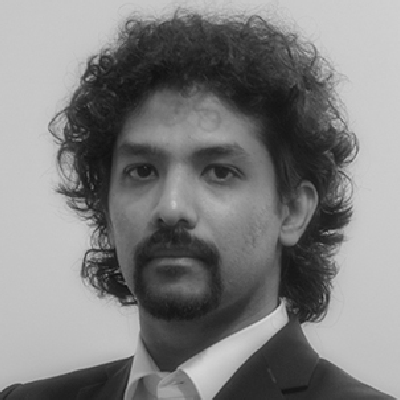
Pradeep Devadass
Pradeep Devadass is an architect and robotic fabrication specialist. He holds an MArch from the Architectural Association and is currently completing his doctoral studies at IP RWTH Aachen University on innovative robotic fabrication methods for architectural applications, developing a ‘smart’ programming environment to bridge the gap between design and fabrication. Pradeep is a co-founder of rat[LAB]-Research in Architecture & Technology and is one of few recipients of the prestigious MAK-Schindler Residency Program Award (Los Angeles / Vienna). He has extensive experience at leading research organizations including Bristol Robotics Laboratory(UK), MAK(USA), Archi-Union(China), and RSP(India). His research work has been published and presented internationally including topics such as adaptive technologies, advanced fabrication techniques and algorithmic design methods.
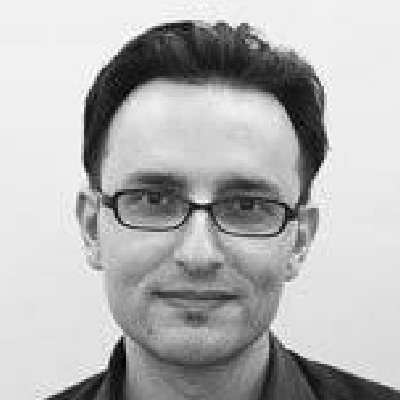
Stylianos Dritsas
Stylianos Dritsas is an Assistant Professor in the department of Architecture and Sustainable Design at the Singapore University of Technology and Design, where he established the Digital Design and Fabrication Laboratory. His research interests in digital technologies investigate how contemporary computer-controlled methods of production affect upstream the way we think and create design. His current research is on sustainable methods for large-scale manufacturing using natural biological materials in collaboration with faculty from material science. Theoretical and applied research work in academia and industry resulted in numerous publications in architectural and engineering conferences and journals as well as awards in research and education. He was an Associate Principal at Kohn Pedersen Fox Associates in London and taught at the Architectural Association in London, UK and Ecole Polytechnique Federale in Lausanne, Switzerland and Harvard Graduate School of Design, Cambridge MA. He is a registered Architect, ARB/UK and Architect/Engineer, TEE/Greece.
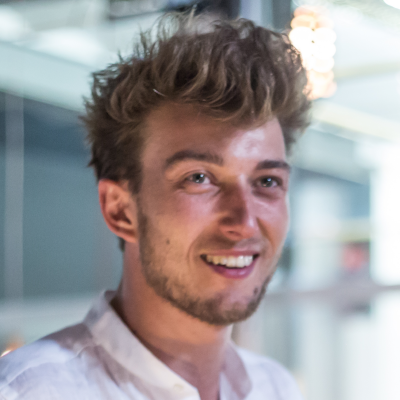
Alexandre Dubor
Alexandre Dubor is an architect expert in digital and robotic fabrication currently working at IAAC as researcher, teacher and project manager in R+D. He studied in architecture and engineering (March. ENSAVT / ENPC, March. IAAC) and have worked in the past at Studio Libeskind, Atenastudio, iDonati, AREP and Appareil. He’s a multidisciplinary designer exploring the potential raised by digital tools and new materials for the improvement of the build environment. He is now leading the Open Thesis Fabrication program as well as the Master in Robotic and Advanced Construction at IAAC.

Augusto Gandía
Augusto Gandía studied architecture at the University of Mendoza, Argentina, between 2005 and 2011. After receiving a DAAD scholarship for further studies, he completed a postgraduate Master in Media-architecture at the Bauhaus University Weimar, Germany, in 2013. He then worked at the office designtoproduction in Stuttgart, and lastly pursued an internship at Gramazio Kohler Research at ETH Zurich. Augusto Gandía’s research interests lie in the programming of bespoke digital design and fabrication processes. In June 2015 he joined the National Competence Centre in Research (NCCR) Digital Fabrication as PhD researcher.

Nadja Gaudilliere
Nadja Gaudillière – Architect, graduate of ENSA Paris – Malaquais (2016) – is a co-founder of XtreeE, a company specialized in large-scale 3D-printing, and currently teaches at the ENSA Paris – Malaquais. At XtreeE, she has been studying the environmental impact of additive manufacturing and its conditions of implementation in the contemporary construction context. She currently contributes to the supervision of XtreeE’s prospective architectural and design projects.

Tristan Gobin
Tristan Gobin is a Director and VP of Construction Automation at HAL Robotics. Alongside his graduation as an Architect (MArch distinction) Tristan has led several architectural robotic workshops at the ENSAPM, the ENSA-Grenoble, the ENPC and the UCL-Bartlett School of Architecture since 2012. He is now a PHD Candidate at GSA and is pursuing his research work combining mathematics, mechanics and architectural design with a special interest in robotics, haptic systems and kinetic architecture. He is in charge of the robotic introduction at the ENPC (national advanced civil engineering school) and the Navier Laboratory (a mixed research unit of École des Ponts ParisTech, IFSTTAR and the CNRS).
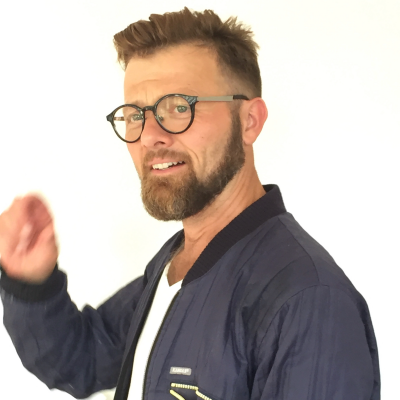
Johannes Portielje Rauff Greisen
Johannes Greisen is Senior Specialist at Danish Technological Institute. He holds a M. Arch. (industrial design) and a PHD from The Royal Danish Academy of Fine Arts, School of Architecture. For over 15 years he has been working with CAM and fabrication in relation to space and architecture; the past ten years specifically with concrete building culture and its utilization of robotics in architecture.
Broadly speaking he first aims to add architectural or technical value rather than cutting cost. Regarding fabrication, he focuses on the relationship between materials, processes and form. Regarding creativity, his focus turns on the interplay between architectural vision, information flow and realities of practice.
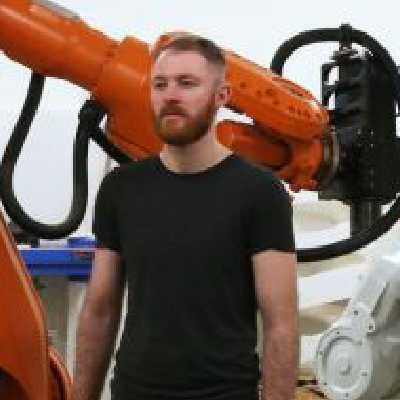
Donn Holohan
Donn Holohan is a designer and educator. A founding partner of multidisciplinary design studio Superposition, he is also currently working as Assistant Lecturer at the University of Hong Kong, where his teaching focuses on empowering designers to effectively engage with emerging technologies through an increased understanding of both material and technical aspects of design.
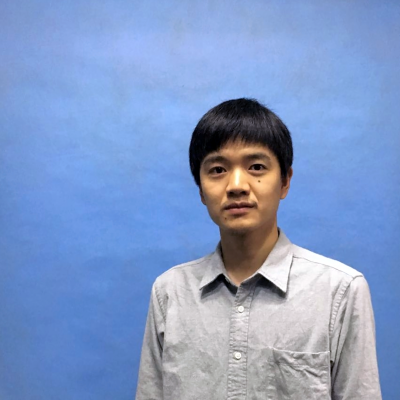
Chai Hua
Chai Hua holds a master degree of architecture from Tongji University, Shanghai. Currently he is a PhD candidate in Tongji University. His research focuses on digital design and robotic fabrication of advanced wood structure.

Yijiang Huang
Yijiang Huang is currently a Ph.D. student in Building Technology Program at MIT, working with Prof. Caitlin Mueller within the Digital Structures research group. His work involves robotic task and motion planning and combinatorial optimization applied to automatic architectural construction. Before coming to MIT, he obtained a B.S. in mathematics at the University of Science and Technology of China and worked as a research assistant in the computer graphics group there.

Hyeonji Claire Im
Hyeonji Claire Im is currently pursuing her Master in Design Studies with a concentration in Technology. Her research focuses on applications of digital fabrication and robotics to novel construction systems and architecture design. She is a licensed architect in Illinois with 8 years experience in a wide range of projects and achieved her accreditation in Leadership in Energy and Environmental Design.
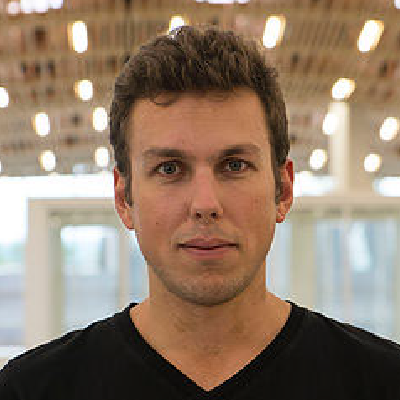
David Jenny
David Jenny has studied at the EPFL in Lausanne, The University of Tokyo in Tokyo and the ETH in Zurich. He has worked in different architectural practices both in Switzerland and Japan and is involved in different ongoing projects; he deals with Architectural Design, Digital Design and Fabrication as well as Architectural Theory. Currently, he is especially interested in the influence of technological innovation on sociological processes and how this relates to Architecture evolving further as a discipline. Since February 2015 David is research assitant at the Chair of Architecture and Digital Fabrication (Prof. Fabio Gramazio, Prof. Matthias Kohler) at the ETH Zurich. He is leading the semester course under the same name dealing with the development of robotic digital fabrication techniques and their implementation in architectural design.

Markus Kayser
Markus Kayser Designer, artist and inventor Markus Kayser is the founder of Kayser Works. His work focuses on novel design and digital fabrication processes at the intersection of design, technology, and biology. Kayser’s research spans from studying swarm behavior in insects to using the Sun’s rays to 3D print glass objects from raw desert sand. His goal is to challenge rigid design and fabrication conceptions by deploying raw energy and materials, biological systems, and technology to develop new forms of making, thereby creating a new suite of tools for design itself. While technological and experimental works dominate his recent endeavors, Kayser also creates lighting and furniture designs with playful inventiveness. Markus Kayser holds a PhD (2018) from the Massachusetts Institute of Technology’s Media Lab, where he conducted research in Mediated Matter Group.
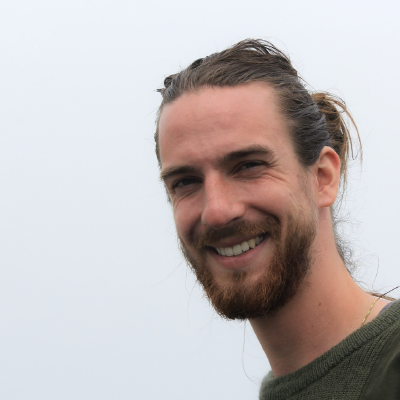
Benjamin Kemper
Benjamin Kemper recently finished his master degree in robotic building (MSc) at TU Delft , where he also worked as a robotic workshop assistant, collaborating with DIA Dessau (Bauhaus). He earned his bachelor degree (BA) in architecture at the Cologne University of Applied Sciences. Early in his academic career, Benjamin gained prototyping and manufacturing experience through several major architectural 1:1 installations and prototypes. He frequently experiments with 3D printing, 6 axis robotic milling, cutting, and printing, 3 axis CNC milling, laser cutting, and machine hacking. His latest research focuses on merging parametric modelling and computer graphic imagery into tangible prototypes.

Hyunchul Kwon
Hyunchul Kwon is a doctoral researcher at Digital Building Technologies (DBT) chair, Institute of Technology in Architecture (ITA), Department of Architecture (D-ARCH), ETH Zurich, exploring new building technologies based on additive manufacturing strategies. His research focuses on multi-directional 3D printing of carbon fiber composites for architecture. He received a Master of Architecture (Dist) from The Bartlett School of Architecture UCL, where he taught and lectured thereafter. His work has been exhibited internationally in museums such as the Vitra Design Museum, the Zaha Hadid Design Gallery, the MAK Museum Vienna, the Design Museum Gent, the Gewerbemuseum Winterthur, the Design Exchange in Toronto and the 2017 Seoul Biennale of Architecture and Urbanism.

Christian Lange
Christian J. Lange is a founding partner of Rocker-Lange Architects, a research and design practice based in Hong Kong and Boston. He is a Senior Lecturer in the Department of Architecture at the University of Hong Kong, where he teaches architectural design and classes in advanced digital modeling and robotics and leads the Robotic Fabrication Lab.

Dan Luo
As a current PhD candidate of Tsinghua University School of Architecture, with a Master of Architecture from Columbia University (2014) and a Bachelor of Art from The University of Hong Kong (2010), my research interest encompass a variety of different topics from robotic fabrication, material computation to VR/AR interface to facilitate assembly and construction. Through the experience I had with a diversity of digital technologies over the years, it is my firm belief that the technology itself would facilitate human in architecture design and fabrication by bridging between the human ability and perception with the emerging natural system and complex spatial information. It would be our prosthesis to see, experience, perceive and interact with the world.

Erik Eugenio Martinez Parachini
Erik Martínez AIA (b. Mexico City, 1986) is a registered architect in New York State. He received his Bachelor of Architecture from Pratt Institute in 2010 and an MSc in Integrative Technologies and Architectural Design Researchfrom the Institute for Computational Design at the University of Stuttgart in 2016. He’s worked at the of TEN Arquitectos in New York, HaasCookZemmrich Studio 2050 in Germany, and is currently an Associate at SHoP Architects.

Wes McGee
Wes McGee is an Assistant Professor in Architecture and the Director of the Fabrication and Robotics Lab at the University of Michigan Taubman College of Architecture and Urban Planning and a principal at Matter Design. His work revolves around the interrogation of the means and methods of material production in the digital era, through research focused on developing new connections between design, engineering, materials, and manufacturing processes as they relate to the built environment. McGee has been recognized with awards such as the Architectural League Prize for Young Architects & Designers and the ACADIA Award for Innovative Research, and his work has been published widely in books, periodicals, and peer-reviewed journals.

Romain Mesnil
Romain Mesnil is a structural engineer and researcher specialized in constructive geometry and structural design. He is currently managing the co-innovation lab of l’Ecole des Ponts ParisTech, and its collaborative platform on digital fabrication for architecture. Research at the co-innovation lab lies at the intersection of structural design, material science and robotics, with special focus on 3D printing of concrete and geopolymers, complex timber structures and in-situ robotics.

Zachary Mollica
Zachary Mollica is an architect and experienced maker whose work explores the integration of digital methods alongside traditional craft knowledge. Zac completed the AA’s MArch Design + Make programme, and after graduating with distinction refused to leave the woods. He now works as the programme’s studio tutor in addition to tutoring the AA’s Robotic Fabrications and SummerBuild visiting schools. Growing up, Zac worked with his father and grandfather, both of them experienced carpenters. He then studied liberal arts and physics before completing his undergraduate architectural studies, and has since worked for architecture and design practices in Amsterdam, Lunenburg, Toronto and Vancouver. Embedded within the AA’s satellite Hooke Park campus, Zac has found the ideal environment to exploit his diverse expertise.

Sina Mostafavi
Sina Mostafavi is a practicing architect, researcher, and educator. Has practiced architecture since 2007, he is the founder of SETUParchitecture, a firm that offers consultancy for innovative design solutions to construction processes. He is currently the manager and coordinator of Robotic Building Lab at Hyperbody group of TU Delft. He is teaching design studios at Delft and Dessau Institute of Architecture at Bauhaus and has led international workshops such as indesme2015-re.craft and and Simaud 2018 at Delft and IASS2015 at Amsterdam. As a Ph.D. and later as a senior researcher at TU Delft, he has focused since 2011 on development and application of design computation to robotic production of hybrid material systems; using multimode subtractive-additive robotic production methods. He has lectured internationally and has been a member of the scientific committees of various journals and conferences such as eCAADe and ACADIA. The results of his work have been published and presented in books, journals and conferences, such as eCAADe 2013 in Delft, Algorithms and Actualization at AA London, eCAADe 2014 in New Castle, ACADIA in Los Angeles, eCAADe 2015 in Vienna, ACADIA in Cincinnati, Rob|Arch 2016 in Sydney, Digital Knowledge in Paris Malaquais, chapters in Towards a Robotic Architecture book and in Mutations-creations, Imprimer-le-Monde, Centre Pompidou . Architectural prototypes and works by him have been featured at international exhibitions, such as construction week in Utrecht, V2 gallery-institute for unstable media of Rotterdam, synthetic Exhibition in Le Mans Lillie and Print the World Exposition in Centre Pompidou Paris.

Tsz Yan Ng
Tsz Yan Ng is an Assistant Professor in Architecture at the University of Michigan Taubman College of Architecture and Urban Planning. She was the Walter B. Sanders Fellow at the University of Michigan (2007-08) and the Reyner Banham Fellow at the University of Buffalo (2001-02). Ng’s practice includes architectural designs and installations in visual art. Common to both practices are projects that deal with questions of labor in its various manifestations, with special focus on techniques in clothing manufacturing and concrete forming.
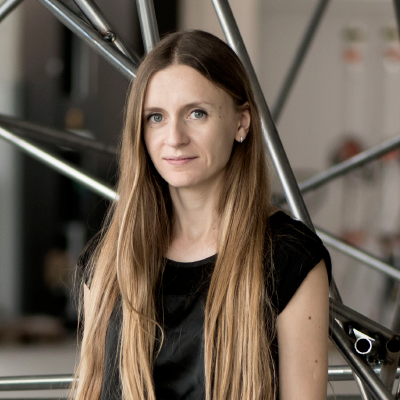
Stefana Parascho
Stefana Parascho is a PhD researcher at Gramazio Kohler Research, as part of the National Centre of Competence in Research (NCCR) Digital Fabrication at ETH Zurich. She received her architecture degree from the University of Stuttgart and has worked for Knippers Helbig Advanced Engineering and Design-to-Production Stuttgart. After her studies, she has taught and researched at the University of Stuttgart, Institute of Building Structures and Structural Design and at ETH Zurich, Gramazio Kohler Research. Her current research focus lies in the development of multi-robotic assembly processes for architectural applications and integrative design methods for the design of robotically fabricated structures.
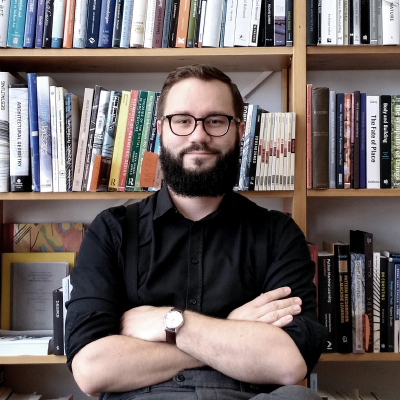
Luka Piškorec
Luka Piskorec studied architecture at the University of Zagreb in Croatia and worked in architectural offices in Croatia and Switzerland. He continued his studies at the ETH Z¸rich and received his Master of Science in Architecture (MSc ETH Arch) in 2011. During his studies, he concentrated on digital fabrication techniques as well as algorithmic programming procedures applied to architecture. He organized and led multiple international workshops on the related topics. In 2011 he started working as a research assistant at Gramazio Kohler Research at ETH Zurich. From 2011 to 2014, he was leading the Chairís elective course and elective thesis workshops dealing with the development of robotic digital fabrication techniques and their implementation in architectural design. From 2015 to 2017 he was involved in organizing and teaching at the newly formed Master of Advanced Studies (MAS) ETH in Architecture and Digital Fabrication. In 2015 he co-founded the Zurich based TEN Association, a group dedicated to initiation and promotion of cultural ventures, with which he won the Swiss Art Awards in 2018. Since 2017 he works as Lecturer in Design of Structures at Aalto University in Helsinki.

Tim Schork
Tim Schork co-founded the transdisciplinary design practice Mesne Design Studio and he is currently an Associate Professor at the University of Technology Sydney, School of Architecture. He received his PhD from RMIT University in 2013 for his research on the transformative effects and contributory role of integrative computational design strategies on the practices of architecture. His research investigates the progressive integration of computational design and simulation techniques with contemporary digital fabrication processes and material technology in terms of their architectonic, constructive, economic and ecological potential. His research focuses primarily on novel design, construction and building processes, materials as well as customised production and digital fabrication. Internationally renowned for his design excellence and explorative, creative and innovative work, his research links diverse disciplines, researchers, institutions and places and combines a sophisticated design philosophy with advanced technology in order to create novel design solutions that address contemporary social and cultural agendas.

Asbjørn Søndergaard
Asbjørn Søndergaard is an architectural researcher and entrepreneur working in the field of digital fabrication in its relation to architectural design. He is co-founder and Chief Technology Officer of Odico Formwork Robotics, an advanced technology enterprise focused at industrial scale development and application of architectural robotics. A Ph.D research fellow at Aarhus School of Architecture, his ongoing doctoral research focuses on the coupling of structural optimization with digital manufacturing. His work centers on the development of new manufacturing interfaces for the realization of topology optimized architectural structures, explored through the fabrication of full scale prototypes.

Sven Stumm
Sven Stumm studied computer sciences at TU Dortmund University finishing his diploma in 2011 with the focus on intelligent systems, while working in software development for mobile robotics as a student assistant. In 2012 he started his professional career as a team member at the chair for Industrial Robotics and Production Automation at TU Dortmund University and focused on research in the field of industrial robotics, as well as process planning. In early 2015 he joined the Association for Robots in Architecture and is currently leading the robotic programming research team at the chair for Individualized Production in architecture at RWTH Aachen University, founded by Sigrid Brell-Cokcan in March 2015. In June of 2018 Sven Stumm handed in his dissertation on the topic of “Interconnecting Design Knowledge and Construction by Utilizing Adaptability and Configurability in Robotics”, which is currently being reviewed.
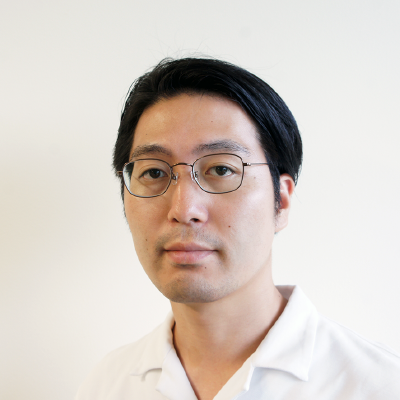
Hiroki Takabayashi
Hiroki Takabayashi is a research engineer at Building Research Institute, Japan, where he researches rational systems of building production utilizing information processing technology. He completed his Ph.D. in 2017 at Chiba University (Chiba, Japan). His research interests include digital fabrication and artificial skills of wooden buildings.

Andreas Thoma
Andreas Thoma graduated 2009 with a Bachelor of Science in Architecture from the Bauhaus-University Weimar, Germany, and 2014 with a Master of Science in Architecture from ETH Zurich. From 2010 until 2012, he worked for the architecture practice Herzog & de Meuron in Basel, Switzerland. He collaborated on a wide range of projects including a large laboratory and office building in Basel, a competition for a museum in the Middle East and several luxury villas in Lugano. In 2011 he joined the firm´s digital technologies group within which he specialized in CNC technology and led the fabrication of Herzog & de Meuron´s contribution to the 2012 Architecture Biennale in Venice. In 2012, Andreas Thoma joined Gramazio Kohler Research at ETH Zurich where he co-led the projects “Iridescence Print” and “Rock Print”. In May 2016, he joined the NCCR Digital Fabrication as project leader for the CTI project “Spatial Timber Units”.
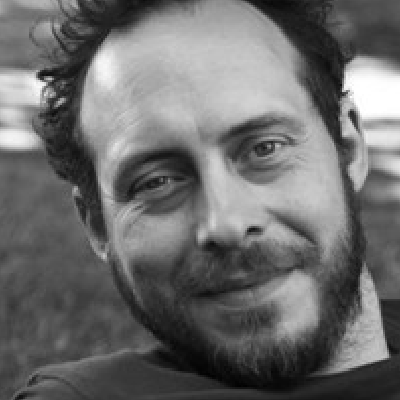
Emmanuel Vercruysse
Emmanuel Vercruysse is an architect, artist, craftsman and robotics specialist, with in-depth experience of both traditional and digital craft. He is Co-director of the AA’s Design + Make programme, and Director of the Robotic Fabrications Visiting School. He holds a BSc, Diploma and Masters degree from the Bartlett School of Architecture, having previously studied furniture design in Belgium, and approaches design as a tacit process. He views the digital as an augmentation of the analogue rather than a substitute and explores the production of architecture intuitively through iterations of drawing, craft, intuition and code. Emmanuel is involved in numerous collaborative practices and research groups including the art practice LiquidFactory, the field robotics group RAVEN and the design collective Sixteen*(makers).

Dylan Wood
Dylan Wood, is a research associate and doctoral candidate at the Institute for Computational Design and Construction at the University of Stuttgart. At ICD Dylan leads the Institute’s research on programmable matter and materials and supervises graduate students in the associated masters thesis topic. His research is focused on developing intelligent design and fabrication principles for ‘smart’ shape-changing materials as a form of material robotics that can be applied in building systems, construction, and manufacturing. He has worked extensively in collaboration with material science partners at the ETH, Zurich, EMPA, Dübendorf, and the Physical Intelligence department at the Max Plank Institute for Physical Systems, Stuttgart. His doctoral research is funded by the Swiss Commission for Technology and Innovation (CTI / KTI), and the Getty Foundation’s GettyLab. He holds a ITECH, MSc. with distinction from the University of Stuttgart, and a B.Arch, magna cum laude from the University of Southern California. Professionally he has worked as a designer and computational fabrication specialist at Barkow Leibinger Architects in Berlin, Germany and DOSU Studio Architects in Los Angeles, CA.
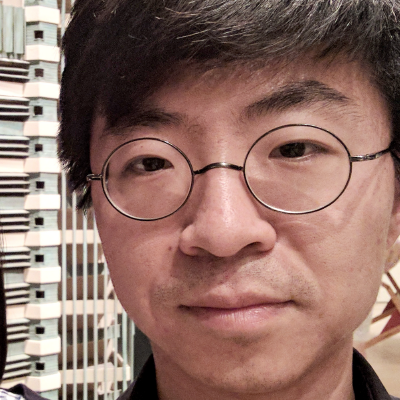
Kaicong Wu
Kaicong Wu is a PhD Candidate at the School of Architecture of Princeton University. He received a Master of Architecture from University of Pennsylvania and a Bachelor of Architecture from Shanghai Jiao Tong University. His research focuses on robotic assembly and architectural design generation.

Maria Yablonina
Maria Yablonina is a research associate and doctoral candidate at the Institute for Computational Design and Construction at the University of Stuttgart. With the completion of her Master degree at the ITECH program in 2015 she also received the faculty’s Diploma Prize. In 2017 she has been awarded a Landesgraduierten-Scholarship for her doctoral thesis. With a strong interest in robotics and digital fabrication techniques, she is currently focusing on exploring potential fabrication techniques enabled through introduction of architecture-specific custom robotic tools for construction and fabrication. Her work includes development of hardware and software tools as well as complementing material systems.
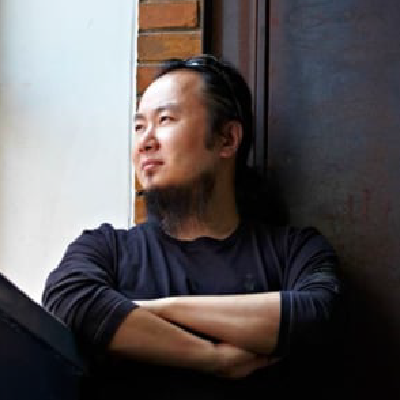
Lei Yu
Lei Yu is an architect and researcher from China focused on computational design, digital fabrication, and interactive architecture. He is the founder of Archi-solution Workshop, cofounder of Digital Architecture Design Association (DADA), China, and cofounder of Laboratory of Creative Design (LCD), China. He is a graduate of the Harvard GSD, and is currently a Ph.D. candidate at the School of Architecture at Tsinghua University.

Sasa Zivkovic
Sasa Zivkovic is an assistant professor at Cornell University where he directs the Robotic Construction Laboratory (RCL), an interdisciplinary research group investigating advanced materials and novel construction technology. Zivkovic is a co-principal of HANNAH, an architectural practice advancing traditional building construction techniques by implementing new technologies and processes of making to address subjects of construction, rapid urbanization, and mass customized housing design. In close collaboration with the high-tech building industry, HANNAH and RCL explore the implementation of construction techniques such as additive concrete manufacturing and robotic wood construction.

